In this blog for people wanting to stop smoking, Robert Walton, a very general practitioner, looks at Cochrane evidenceCochrane Reviews are systematic reviews. In systematic reviews we search for and summarize studies that answer a specific research question (e.g. is paracetamol effective and safe for treating back pain?). The studies are identified, assessed, and summarized by using a systematic and predefined approach. They inform recommendations for healthcare and research. to help you start your new smoke-free life.
Page updated on 17 November 2022 to include new evidence on e-cigarettes from the living systematic reviewA Living Systematic Review is a systematic review which is continually updated, incorporating relevant new evidence as it becomes available. Electronic cigarettes for smoking cessation (updated November 2022).
Take-home points
Vape to quit?
The evidence is stacking up for vaping as an effective way of giving up tobacco. A Cochrane ReviewCochrane Reviews are systematic reviews. In systematic reviews we search for and summarize studies that answer a specific research question (e.g. is paracetamol effective and safe for treating back pain?). The studies are identified, assessed, and summarized by using a systematic and predefined approach. They inform recommendations for healthcare and research. Electronic cigarettes for smoking cessation (most recently updated in November 2022) showed (with high quality evidence) that people using a vape device were more likely to stop smoking than those using more conventional forms of nicotine replacement therapy such as sprays, gum, patches or lozenges.
Nicotine replacement therapy has for many years been the gold standardThe intervention that is widely accepted as being the best available, against which new developments should be compared. For example, a particular medicine. for smoking cessation against which all new treatments were measured. Many researchers were surprised that vaping nicotine turned out to be a more effective way of stopping smoking than other commonly used treatments. Some thought that people would continue to vape as often as they smoked, however this doesn’t seem to be the case. In fact people find vaping helpful for stopping smoking perhaps because it reproduces in part some of the actions and sensations involved in smoking behaviour which the conventional forms of nicotine replacement do not.
Common side effects reported by those using nicotine e‐cigarettes were throat or mouth irritation, headache, cough and feeling sick. These effects reduced over time as people continued using nicotine e‐cigarettes. Reassuringly the review also found no evidence of a difference in frequency of side effects in those using vape devices compared to people on conventional nicotine replacement although it is not known whether problems may arise from vaping over the longer term.
Nicotine replacement – patches, gum and lozenges
They’re starting to look old fashioned now compared to the trendy new vape devices, but there’s high quality evidence that they work. A Cochrane Review Nicotine replacement therapy versus control for smoking cessation (published May 2018) with information from more than 60,000 people shows that any form of nicotine replacement therapy is better than placeboAn intervention that appears to be the same as that which is being assessed but does not have the active component. For example, a placebo could be a tablet made of sugar, compared with a tablet containing a medicine. for stopping smoking. The effects were pretty consistent across all the different forms of nicotine replacement therapy with the rateThe speed or frequency of occurrence of an event, usually expressed with respect to time. For instance, a mortality rate might be the number of deaths per year, per 100,000 people. of quitting about 50% higher with nicotine replacement.
Side effects from the treatmentSomething done with the aim of improving health or relieving suffering. For example, medicines, surgery, psychological and physical therapies, diet and exercise changes. were generally minor such as irritation from the nicotine patches and serious side effects were very rare overall although chest pain was more common in people using nicotine replacement therapy. For conventional forms of nicotine replacement therapy we have long term dataData is the information collected through research. on safetyRefers to serious adverse effects, such as those that threaten life, require or prolong hospitalization, result in permanent disability, or cause birth defects. including for people at high riskA way of expressing the chance of an event taking place, expressed as the number of events divided by the total number of observations or people. It can be stated as ‘the chance of falling were one in four’ (1/4 = 25%). This measure is good no matter the incidence of events i.e. common or infrequent. of unwanted effects such as those who already have heart disease and for pregnant women. Although its likely to be very much safer than smoking, vaping hasn’t been around long enough to assess side effects of long term use. In addition to their longstanding track record for satety, patches and lozenges are flexible and can be used at work and in social settings where vaping would not be possible.
In these difficult times another benefit of traditional nicotine replacement therapy is that it remains free of charge in the UK through the NHS smoking cessation services whereas vaping devices and liquids need to be purchased from dwindling household budgets.
Smoking and mental health
Smoking may make you feel better while you’re having a cigarette, but there is new evidence that kicking the habit probably slightly improves your mental health.
A Cochrane Review Smoking cessation for improving mental health (published March 2021) looked at levels of anxiety and depression in people who successfully stopped smoking compared with those that continued. The reviewers found that there was probably a small but important reduction in symptoms. The size of the benefit in mental health is about the same as would be gained by taking antidepressant medication (you can hear about this in the Cochrane Podcast: Does stopping smoking improve mental heath? And it was particularly interesting to see that mental health probably improved after stopping smoking both in people who had problems initially and also in those that didn’t. Or thought they didn’t!
Withdrawal from tobacco may be tough in the first few weeks but there’s light at the end of the tunnel.
More information
NHS Better Health Quit Smoking
Evidently Cochrane blogs (you can see the key messages here and click the links to go to the blogs):
Quitting smoking: which types of behavioural support work best to help people stop?
Smoking and COVID-19
Smoking and coronavirus (COVID-19): time to quit
Stop suddenly or cut down first?
What is the best way to stop smoking – should I stop suddenly or cut down first?
Quitting smoking in pregnancy
What helps women to quit smoking while pregnant?
Join in the conversation on Twitter with @rtwalton123 @CochraneUK or leave a comment on the blog.
Please note, we cannot give specific medical advice and do not publish comments that link to individual pages requesting donations or to commercial sites, or appear to endorse commercial products. We welcome diverse views and encourage discussion but we ask that comments are respectful and reserve the right to not publish any we consider offensive. Cochrane UK does not fact check – or endorse – readers’ comments, including any treatments mentioned.
Robert Walton reports grants from NIHR Health Technology Asessment, grants from NIHR Programme Grants for Applied Research, personal fees and other from TTS Pharma, outside the submitted work; In addition, Dr. Walton has a patent WALTON R, MCKINNEY E, MARSHALL S, MURPHY M, WELSH K, others. GENETIC INDICATORS OF TOBACCO CONSUMPTION. Patent number: 2001038567. Filed date: 24 Nov 2000. Publication date: 01 Jun 2001 with royalties paid to gNostics, and a patent Tucker MR, Walton R, Matthews H, Miskin A. Method and Kit for Assessing a Patient’s Genetic Information, Lifestyle and Environment Conditions, and Providing a Tailored Therapeutic Regime. Patent number: US20110251243 A1. Application number: US 12/944,372. Filed date: 11 Nov 2010. Publication date: 13 Oct 2011 issued to None.


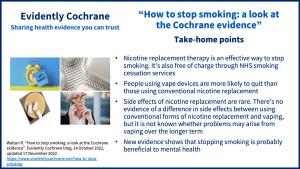
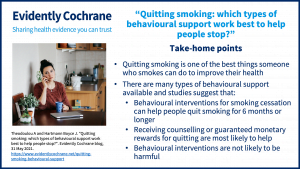
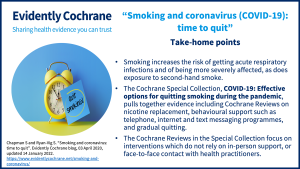
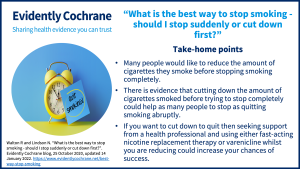
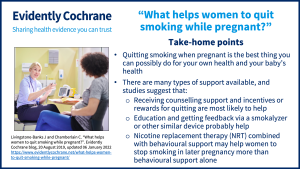

Embarking on a journey towards a smoke-freelife is a commendable decision that requires support and evidence-based strategies. Robert Walton, a seasoned general practitioner, delves into Cochrane evidence to guide individuals in their quest to quit smoking.
This article can prove a good one for those who want to stop smoking.
[…] If you or anyone you know wants to see facts on vaping and other methods of quitting smoking with links to evidence to back this up, visit the site here – evidently Cochrane – how to stop smoking. […]
[…] If you or anyone you know wants to see facts on vaping and other methods of quitting smoking with links to evidence to back this up, visit the site here – evidently Cochrane – how to stop smoking. […]